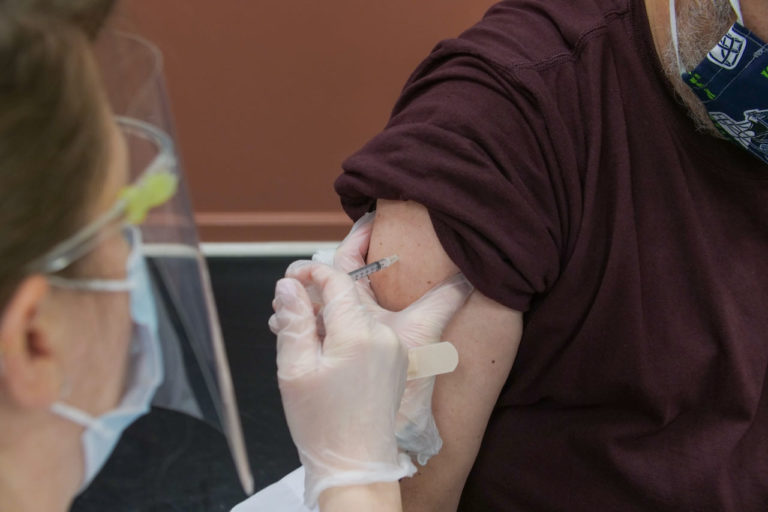My American Staffordshire Terrier, Billie, is a self-appointed therapy dog. She has a radar for dog people who want or need Billie love and walks down the sidewalk with a mission of identifying and connecting with them all. A few weeks ago, she set her sights on a handsome young man sitting on a bench next to the beach. As Billie did her thing, he and I got to chatting about the pandemic.
I recall our conversation vividly now, as the delta variant ramps up, bringing new peaks in Covid-19 infections, particularly in places with low vaccination rates. Hair-trigger emotions and judgment are more often the rule when it comes to vaccine conversations, instead of listening and empathy. That’s become even more true since our brief interaction.
I was feeling self-conscious because I had just started wearing a face mask again outdoors when people were around, and stuck out like a sore thumb. News reports of the rapid spread of the delta variant had ended a few weeks of blissful freedom from the mask; I spend enough time following epidemiologists and pandemic news that I could see the writing on the wall.
When the CDC loosened mask guidelines April 27, it felt like I was one of the last people to take mine off. After so many months of the mask being a habit, I felt naked without it. Besides, I got my second vaccination in mid-May so wasn’t fully covered until the end of the month. I developed asthma when I lived in New York City during and after 9/11, breathing the toxic air, so am high risk.
Eventually, I took the mask off outdoors and in my building, although I kept it on in stores and public transportation. But it was short-lived.
The young man and I talked a bit about my mixed feelings about the mask and about how relieved I was once I got the vaccine. Our conversation was an example of mutual risk empathy: actively seeking to understand how and why others perceive and act on risks the way they do.
Thankfully, the young man did not seem to be one of those rabid anti-maskers. If he was, he was biting his tongue for Billie’s sake. He said had not yet gotten his shots yet; it sounded like his feelings about the vaccine were as conflicted as mine about the mask.
He openly explained his logic: He’s young and healthy and doesn’t socialize a lot or have to worry about vulnerable relatives. He felt he didn’t have enough information and doesn’t watch or listen to much news or spend time on social media. The whole pandemic situation makes him uncomfortable. He worried that the vaccines on offer had not yet been formally approved and that they had been developed too fast. He was afraid that the vaccine would interrupt his body’s ability to do its thing. There was not a word about owning the libs or freedom versus supposed totalitarianism or any of the other political tribalism that’s been going around.
I shared with him some of the insights from my work on risk. First, it’s understandable that the vaccine makes him uncomfortable because when we have less knowledge and feel more dread, we see things as being riskier than we might otherwise. Second, I borrowed language I’d read somewhere (wish I could remember to give credit where due) to suggest that he think of the vaccine as a book giving his body the information it needed; he wouldn’t go into a final exam without studying, so he shouldn’t expect his immune system to fight a pandemic unprepared. Third, I explained that the reason scientists were able to develop the vaccines so fast was because they had been working on the new technology for quite some time; and that negative side-effects were so small and much less risky than the coronavirus itself.
Finally, even though he didn’t have to worry about relatives, his work as an Uber driver exposed him to his passengers and each of them to him. That’s high risk.
When he said he was planning to move to Miami, I was especially alarmed. Florida had one in five cases in the entire country, a shockingly high rate though not surprising given its governors open flouting of the recommendations of public health experts. That put him at even more risk.
“Promise me you will not go to Miami without getting the vaccine,” I told him. He said he’d consider it seriously, and that he would actively seek out more information so that he felt comfortable with the vaccine. I like to think that he has followed through, though there’s no way of knowing.
As Billie and I walked home, I congratulated her for her work in her new role as a vaccine hesitancy dog.
In May, I wrote for strategy+business about the risk ethics of vaccine requirements. At the time, many businesses were hoping that information like what I’d shared, combined with some carrots, would carry the day so that they did not need to mandate vaccines.
New information and yet another surge in cases, concentrated in low-vaccine states, have changed that. New CDC data shows that the delta variant appears to cause more severe illness than earlier versions and spreads as easily as chickenpox.
A growing number of businesses and local governments have decided “No More Mr. Nice Guy” and started requiring proof of vaccine in situations including workplaces, indoor dining, and large crowds.
National governments also have taken a harder line. France passed new vaccine requirements starting this month. President Joe Biden announced that all federal workers must get vaccinated or get weekly Covid tests. The CDC issued new federal mask guidelines for areas with higher infection levels.
Proof of vaccination and masks will be required at Broadway shows. Facebook, Disney, and Walmart [paywall]joined Google, Netflix, Delta, and BlackRock in requiring vaccines for employees returning to the office. Even Fox News, whose personalities famously rail against vaccinations and masks, has given employees a choice: get your jab or continue to submit to daily health screenings.
The number of companies following suit in requiring or strenuously encouraging vaccines increases daily as the business argument for vaccinations becomes crystal clear: for economies to fully re-open, we need to defeat Covid-19.
There’s been a noticeable shift in opinion on social media and in news media, from headlines like “We should soon stop catering to the vaccine holdouts”and “Conservative says it’s time to stop coddling vaccine resisters — and time to start mandates.” There’s talk of higher insurance rates for the unvaccinated -or even going farther still in creating financial consequences for people whose decisions affect others. I’ve seen countless tweets expressing exasperation over vaccine holdouts and must admit that I can relate.
A letter to the editor in the Kansas City Star read: “In the spirit of Missouri’s GOP leadership, those who made the personal choice not to get vaccinated should be personally responsible for their own costs should they contract COVID-19. The cost to be vaccinated is free. The cost of hospitalization can run well over $25,000 per patient. The American taxpayer should not have to foot the bill because of their choices.”
Just a few months ago, when it was still not easy to get vaccines and when we had less information, it was easier for the vaccinated to show empathy for the holdouts. Even a few weeks ago, the conversations were easier. As those of you who follow my work know, I am a big proponent of the power of risk empathy. But empathy can only go so far when it is one-sided.
Now, the tide has shifted as not enough of the anti-vaxxers and anti-maskers have demonstrated empathy for the rest of us who have done our part to stop the spread of Covid-19.
Happily, vaccination rates are rising in all 50 states, a trend in the right direction. And Pfizer’s Covid-19 vaccine may get full approval (as opposed to the current emergency use approval) by early September, which would remove one barrier for the vaccine hesitant.
Read more about risk empathy in my new book, YOU ARE WHAT YOU RISK: The New Art and Science of Navigating an Uncertain World.
This article is part of my LinkedIn newsletter series, “Around My Mind” – a regular walk through the ideas, events, people, and places that kick my synapses into action, sparking sometimes surprising or counter-intuitive connections.
To subscribe to “Around My Mind” and get notifications of new posts, click the blue button at the top right of this page . Please don’t be shy about sharing, leaving comments or dropping me a private note with your own reactions.
- The Gray Rhino Wrangler on Substack - January 1, 2025
- Gray Rhino Risks and Responses to Watch in 2024 - January 10, 2024
- In the Media 2023 - December 31, 2023


